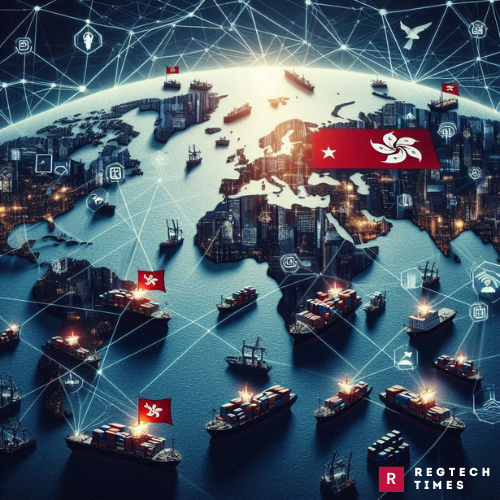In recent years, Hong Kong has emerged as a critical player in the intricate web of sanctions evasion, particularly concerning Russia’s ongoing conflict in Ukraine. A recent report by the Committee for Freedom in Hong Kong Foundation highlights how the city has become a pivotal hub in evading international sanctions, primarily through maritime logistics and trade.
Hong Kong’s Facilitating Role in Sanctions Evasion
The term “dark fleet” refers to a network of ships operating under flags of convenience to avoid international scrutiny and comply with sanctions. These vessels are often registered in countries with lenient regulations, allowing them to evade detection and continue their operations unimpeded. According to the Committee for Freedom in Hong Kong Foundation’s report, Hong Kong has become central to this network, significantly undermining the effectiveness of Western sanctions aimed at stifling Russia’s war efforts.
The report, titled Beneath the Harbor: Hong Kong’s Leading Role in Sanctions Evasion, highlights troubling trends. Between 2022 and 2023, Hong Kong’s exports of semiconductors—critical technology components—nearly doubled to Russia. Notably, from August to December 2023, around 40% of the $2 billion in shipments to Moscow included goods on the US and EU’s lists of restricted advanced components, such as computer processors and digital storage units. These items are vital for Russia’s military operations, raising concerns about Hong Kong’s role in facilitating sanctions evasion.
Further compounding the issue, the report identifies numerous Hong Kong-registered companies aiding Russia, Iran, and North Korea by facilitating the transportation of sanctioned oil and gas. Many of these companies are affiliated with Russian entities like Far Eastern Shipping, Sovcomflot, and Novatek. Sovcomflot, for example, is known for using multiple subsidiaries to obscure the identity of its vessels, making it difficult for authorities to track and sanction them effectively.
Sberbank Expands in India; Bets on Boosting Russia-India Trade Amid Sanctions
Hong Kong’s Stance and International Reactions to Sanctions Evasion
Hong Kong’s involvement in sanctions evasion is not entirely new but has been increasingly scrutinized. The US-China Economic and Security Review Commission’s report and research by the Carnegie Endowment for International Peace also highlight Hong Kong’s role as a transshipment hub for microelectronic components to Russia, facilitated by the city’s alignment with China’s broader geopolitical strategies.
The Hong Kong government has openly stated that it does not recognize or implement unilateral sanctions imposed by other nations, reflecting its stance of non-compliance with foreign sanctions. This position has been criticized by various international observers who argue that Hong Kong’s lax regulatory environment and its significant financial and logistical infrastructure make it an attractive base for sanctions evaders.
Despite the growing scrutiny, there are signs that the effectiveness of the dark fleet may be waning. Craig Kennedy of consultancy Navigating Russia notes that the shadow fleet’s growth has stalled, partly due to economic pressures and increasingly challenging conditions for acquiring second-hand tankers. The cost of maintaining this fleet has surged, with estimates suggesting that Russia would need to invest upwards of $25 billion just for initial vessel acquisitions.
The Path Forward: Strengthening Sanctions Enforcement Against Evasion
Kennedy’s analysis indicates that, while Hong Kong’s support extends the operational life of the dark fleet, the overall effectiveness of this fleet is diminishing. The International Maritime Organization has even designated some vessels under dubious flags like Eswatini as “False Eswatini,” reflecting efforts to counteract these evasive tactics.
The solution to this growing problem lies in more prompt and robust action from sanctions authorities. Samuel Bickett, author of the report, argues for a more aggressive approach in targeting the core infrastructure that supports sanctions evasion, including banks, logistics firms, and corporate service providers. The current process, which often focuses on entities rather than individuals and can take months, allows evaders to stay ahead of enforcement measures.
Moreover, while there have been requests to Hong Kong banks to report suspicious activities related to sanctions evasion, the effectiveness of these measures remains uncertain under the current political regime.
Hong Kong’s role in sanctions evasion highlights a significant challenge in the global effort to enforce economic and political pressure. The city’s strategic position and regulatory environment continue to play a crucial role in enabling the dark fleet, highlighting the need for more effective and timely sanctions enforcement mechanisms to address this complex issue.


